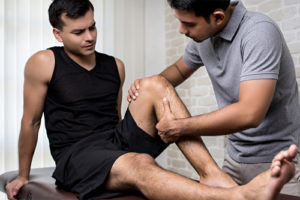 Sports medicine professions are attractive to many. Many of us have younger years dotted with practices and games, camps and overnights. And while this passion for health, for movement, and for athletic participation may not gain everyone a spot on the NFL field, it can lead to a fulfilling career in an area one has already loved for a very long time.
Sports medicine professions are attractive to many. Many of us have younger years dotted with practices and games, camps and overnights. And while this passion for health, for movement, and for athletic participation may not gain everyone a spot on the NFL field, it can lead to a fulfilling career in an area one has already loved for a very long time.
There is no question that the most common bachelor’s degree achieved for one desiring a sports medicine profession is a sports medicine degree. Sports medicine degree programs prepare their students for a variety of careers in both athletics and medicine. Common careers for sports medicine degree program graduates include athletic trainer, personal fitness trainer, physical therapy clinic trainer, rehabilitation specialist, or an athletic coach.
Sports Medicine Bachelor’s Degree(s)
Program Overview
Sports medicine degree programs champion their interdisciplinary education. The field is broad, encompassing everything from athletic training to exercise science and nutrition. A sports medicine degree should give its students the skills needed to work with both individuals and communities, working to improve both individual and social health.
It is common for sports medicine degree programs to offer a specialization. Typical specializations or concentrations include exercise science, health sciences or rehabilitative science. If you have found or are looking at a bachelor’s degree specifically in sports medicine but without offered specializations, it will likely still be impacted by whether it is offered by the department of medicine, physical education, physical therapy, or kinesiology.
It is important to understand that there are many bachelors’ degrees that may be referred to as sports medicine degrees. This includes degrees like a BS in Health Education and Behavior, a BS in Health Science, a BA in Healthy Lifestyle Management, and a BS in Exercise Science. The following discussion of sports medicine degree programs is not specific to one bachelor’s program, but instead is meant to display general knowledge about all sports medicine program details and goals.
Program Location
Sports medicine bachelor’s degree programs are available on campuses across the country. Sports medicine degrees online are also a readily available option for qualified students.
Length of Program
Sports medicine degree programs are similar to other undergraduate programs. A student who stays on track can expect to finish their bachelor’s in four years. The first two years of education are often filled with general requirement courses and electives, while the final two years of education are specific to the bachelor’s program chosen. Sports medicine degrees online are usually going to have a similar timeframe, though it is not uncommon for them to offer greater schedule flexibility and/or the potential for a slower pace. Should a student transfer into a sports medicine degree program (on-campus or online) or already have existing transferrable credits, it may take as little as two years to complete a sports medicine major.
Expected Courses and Education
Generally, sports medicine programs seek to give their students a strong foundation in both health sciences and behavioral sciences. This will include fundamental knowledge surrounding exercise and fitness as they relate to human physiology, as well as a particular emphasis placed on the ability to recognize, prevent, evaluate, and treat fitness related injuries and poor practices.
Please note that the following list is neither exhaustive nor conclusive. Specific courses are going to depend on what sports medicine bachelor’s degree you have chosen to pursue, what department offers the degree, and what your chosen specialization (if you have one) is.
The courses listed below are typically taken in addition to (or after the completion of) general elective course and requirements (like math, English, humanities and/or foreign language(s)).
Potential Courses
- Human Anatomy and Physiology
- Kinesiology
- Nutrition
- Fitness and Culture
- Emergency Assessment and Care
- Biomechanics
- Principles of Sports Medicine
- Theories of Sports Medicine
- Injury Evaluation and Treatment
- Therapeutic Modalities
Clinical Practicum Experience
Depending on one’s specific bachelor’s degree chosen or area of specialization, a clinical practicum experience or internship may be required. These experiences are often completed in the student’s final quarter or semester (15-20 credits) and are typically full-time supervised work experiences.
Master’s Degree Potential
While many may choose to gain employment immediately after graduation from their bachelor’s degree program, other students choose to continue in pursuit of a master’s or professional degree. This choice to continue is often made in order to open up the door to a career as a physical therapist, an occupational therapist, a nutritionist, a nurse, or a physician.
How Do I Choose a Program?
There are so many options available to today’s student that it can make it extra difficult to know how to make your choice. As you consider bachelor’s programs, pay attention to the things that matter specifically to you. Is tuition a big deal? Then pay attention to costs/credit and whether or not there is flexibility in the student schedule for part-time work. Do you already know what you want your professional career to be? Then apply to programs that offer a specialization that focuses on that area. Lastly, though there are specific sports medicine degree programs, don’t forget to look at degrees in health sciences, exercise science, or healthy lifestyle management, as those too will set you up well for a career in sports medicine.
Laura Mansfield
Master of Healthcare Administration (MHA) | Sacred Heart University
Associate’s Degree of Nursing (ADN) | North Seattle Community College
Bachelor of Business Administration (B.B.A.), Marketing, Sales | University of Washington (Seattle)
January 2020
More Articles of Interest:
